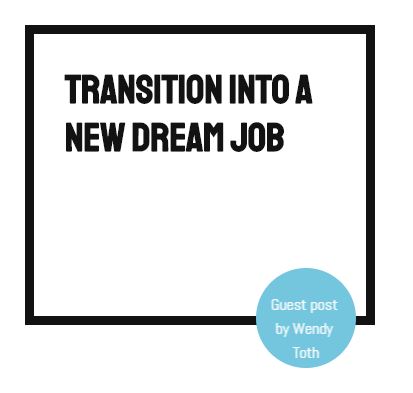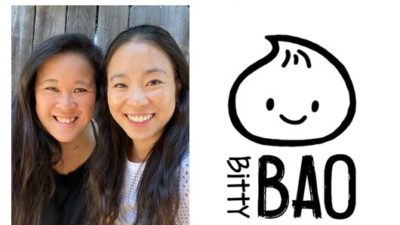As part of the Save My Cents ongoing free career content series, I am excited to partner with Wendy Toth on this blog post to help career changers think through transitions. Wendy is a writer and career transition coach who has developed a six week intensive coaching program called Land a Job You Love, which can help you get unstuck from a career rut and land your next dream job. Wendy is generously sharing some of that very valuable advice right here. As part of this blog, we are giving away ONE enrollment in Wendy’s Self-Paced Study version of Land a Job You Love, valued at $1,000! It includes a 45 minute coaching session with Wendy. To enter, please visit this link. The giveaway closes at 11:59PM Eastern Standard Time on May 1, 2020.

Need to make a career change, but don’t know where to start? Does taking that first step seem overwhelming and scary?
When you first entered the job market, you likely got into a career track at a company with specific titles and a structure. The goal is to move up through a pre-determined path. And that feels good. Safe.
Until, like now, it’s time to move on. Suddenly, you’re not sure what the rules are. No one is telling you, “Here are the three next roles you can be promoted into.” The lack of structure can be terrifying.
In my early 20s, I was a reporter for a relatively unknown magazine called Supermarket News. It was an amazing job, but at the time, all I cared about was working somewhere with a recognizable name. The publishing company that owned Supermarket News also owned dozens of name brand magazines, so I met with HR to ask about a move to one of these fancier places.
Do you know what they told me?
That it was extremely unlikely for one of their trade magazine employees to transfer over to a name brand magazine. That it was an unwritten rule. I was so dejected! Though I knew it wasn’t actually true, I had absorbed the idea that this HR department made the rules, not just for the company, but for me!. I needed a new plan.
Before You Start, Forget the Rules
After wallowing for a few days, I called out sick to meet a mentor for coffee. I was actually sweating when we met up. It felt like I was breaking a rule simply by asking her advice. She knew a lot of people who had made the transition that I wanted to make. I just needed to hear her tell me it was do-able.
A few weeks later she helped me land an interview at a name brand magazine owned by a different company. She gave me the mindset I needed to sell myself. I got the job! She showed me this career change was doable. That I could sell myself without feeling like I was breaking rules or exaggerating my potential. Now, I’m going to share with you three actionable steps to take for changing your own career.
Step #1: You are the Product
Start thinking of yourself as the CEO of your own company, where YOU are the product: You, Inc. Every skill you have, everything you learn, and every connection you gain all contribute to making the product better and the company stronger.
Any career change is going to come with a handful of problems or challenges (such as your own HR department telling you what you want is impossible). By thinking of yourself as a product that’s getting stronger and smarter, you are more likely to persist and overcome failures. You, as a product, have something valuable to contribute.
Step #2: Defining You, the Product
It’s interesting to hear people’s subconscious barriers appear in their everyday conversations.
Someone who proofreads thousands of words of email copy a week might say, “I want to try copywriting, but I’m not a writer.” To which I might gently point out, “Didn’t you rewrite a few hundred sentences last month, all of them written by an official ‘writer’?” Or a teacher who wants to start a side business providing busy families with a meal planning service may feel under-qualified, until she looks at the years of lesson planning under her belt, and applies the same principals. You might see someone who is wildly successful and does not look like you, and thus say, “I will never be that successful”.
Another way to bar those rules from stopping you is to define your product more clearly. Since you are the product, you will need to get comfortable talking positively about yourself and what you have to contribute, quickly.
This can be difficult, especially if you feel that you don’t have any socially-acceptable credibility markers in your chosen field. For instance:
- You know you want to be a writer but you have no clips or bylines in major outlets.
- You want to move to a management position but you think you need an MBA first.
- You want to transition from customer service to marketing, but you’ve never had a marketing job.
Stop. You have skills. They might be hiding in plain sight. Take out your resume. Look at all of your past experiences, (work AND volunteering) and spend 15 minutes finding patterns or repeated experiences you have had in different contexts. Those patterns represent your transferable skills.
You will find that you possess a few other qualities that can be transferred from one type of work to another. These will fall into categories that go beyond just skills and may include things like your values, or processes you use. As a group, I like to call all of these transferable qualities your “Selling Points,” as a reminder that each one makes the product of YOU special. The categories for your transferable qualities or “Selling Points” are listed below. In each case look for patterns related to the category across your breadth of experience. Check out the Your Selling Points PDF Worksheet for specific writing prompts and examples of Selling Points for each category.
- Skills
- Projects
- Audience
- Style of Work
- Tools
- Values
Step #3: Selling the Product
When I did this exercise in my journalism days, the biggest Selling Point I uncovered was my Audience. At Supermarket News I primarily researched and reported on the shopping habits of the “female head of the household.” I was an expert on this market segment—the very same segment that most women’s magazines have as their target audience. My laser-sharp focus on the female head of the household became my strongest Selling Point in getting an editing job at a name brand magazine.
Once you have a handful of Selling Points written out, you can mix and match them as needed to help you find and land a new role.
I highly recommend reading your Selling Points out loud to yourself in the mirror every few days for a while. You’ll get to know them so well that you can use them naturally to answer interview questions, speak to friends about your career, and address any mentor who wants to provide an opportunity but isn’t sure if you’re ready, all without sounding sales-y.
You’re just sharing what’s unique about the product of YOU.
Wendy Toth is a longtime journalist, publishing exec, and career transition coach focused on helping kick*ss women who feel stuck. For more tips on changing careers without giving up who you are, join her career coaching newsletter.










